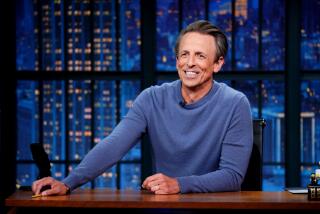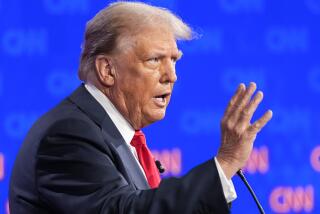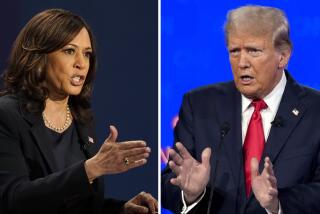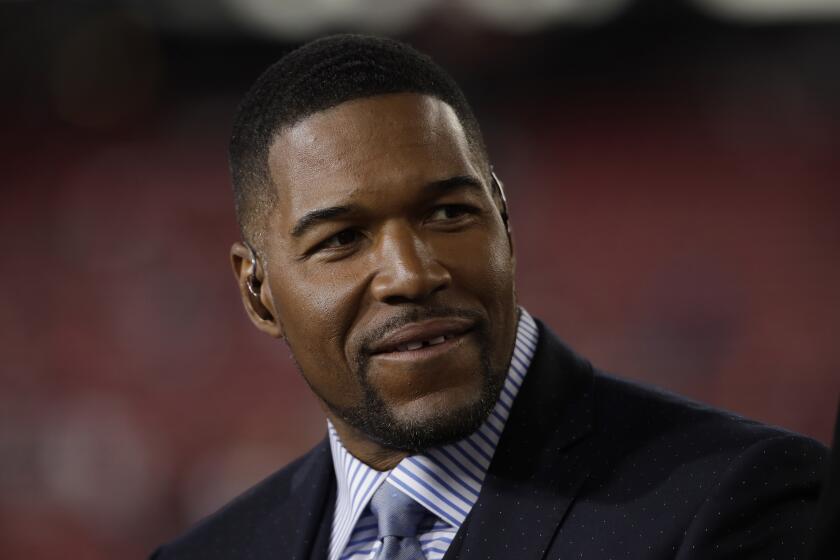Stephen Colbert discusses the new ways he’s able to satirize Trump with ‘Our Cartoon President’
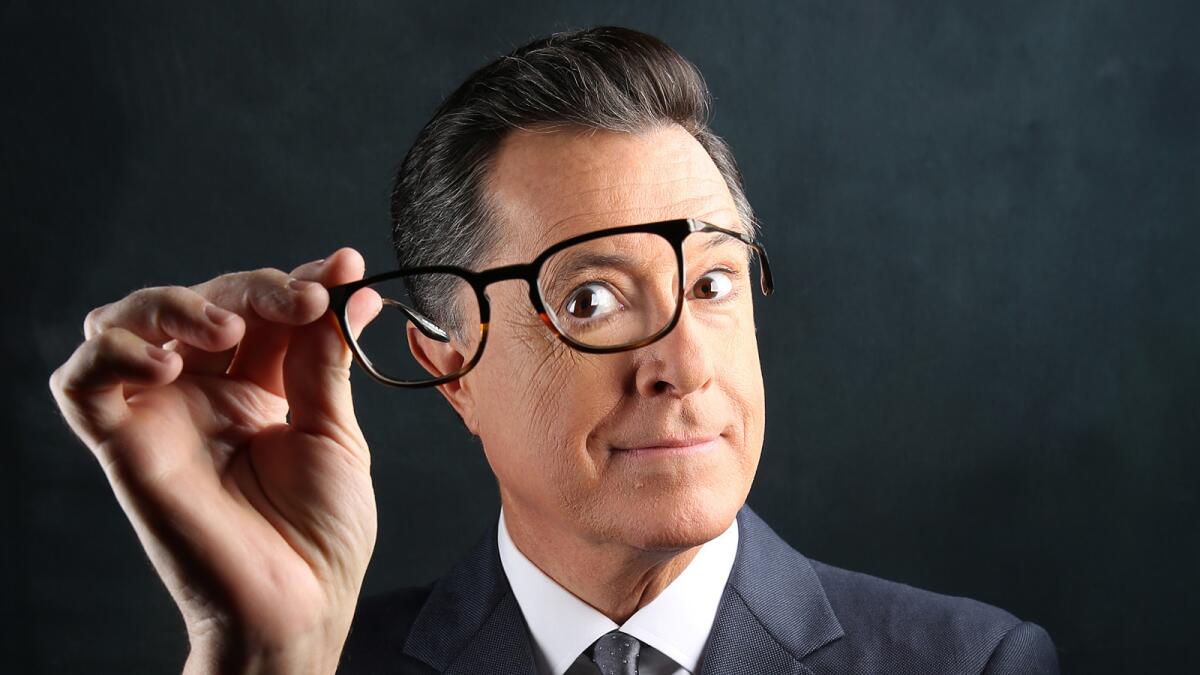
When Stephen Colbert was about 8, he wrote a letter to President Richard Nixon about an issue very dear to his heart.
“I said, ‘My name is Stephen Colbert and I believe we should have a continental flag. Can we at least have a conversation about this?’” the host of “The Late Show” recalled during a recent trip to the West Coast. “We have national flags and state flags, why don’t we have a continental flag?”
In return, Colbert received a book of photos of Nixon with children, “which you don’t picture,” he says. (Sadly, he no longer has the book.) A similar letter to Canadian Prime Minister Pierre Trudeau yielded no response, while a gracious staffer for Mexican president Luis Echeverria wrote back to say the idea had been floated at a recent cabinet meeting and “there was a lot of excitement” around it.
Forty-five years later, the nerdy youngster — or, as Colbert prefers to put it, “civically engaged” — who once corresponded with world leaders now has has a growing TV comedy empire dedicated to telling politicians what he thinks.
After a wobbly start as David Letterman’s successor at CBS, Colbert has since turned the New York-based “The Late Show” into late night TV’s most-watched program, largely by providing nightly catharsis for millions of Americans distressed by the current state of politics.

And beginning Feb. 11, the former “Daily Show” correspondent will expand his satirical franchise with “Our Cartoon President,” an animated series lampooning the colorful personalities, complicated relationships and non-stop controversies of the Trump administration. Colbert is actively involved as an executive producer on the series, which will air on CBS’ sister network Showtime and shows up as a guest star in the series premiere.
On this afternoon, virtually the only thing anyone wants to talk about is “Fire and Fury: Inside the Trump White House,” the dishy exposé by Michael Wolff released a day earlier. That includes Colbert, who has had the book FedExed overnight.
“Our Cartoon President,” will offer a different, more obviously fictionalized take on Trump and his inner circle, including First Lady Melania, grown children Ivanka, Eric and Donald Jr., chief of staff John Kelly and embattled Atty. Gen. Jeff Sessions. The 10-episode series will also skewer media personalities, such as the fawning hosts of Trump’s favorite morning program, “Fox & Friends.” The premiere episode, which is currently available to view on YouTube, follows Trump (Jeff Bergman) as he prepares to deliver his first State of the Union address, which the real president did Tuesday.
”We have a president with a cartoonish personality and ambitions so, in some ways, no world is better equipped to accommodate him comedically than a cartoon one,” says showrunner R.J. Fried, previously a writer for the “Late Show With David Letterman.”
I don’t think we need another series of jokes about what Donald Trump did today.
— Stephen Colbert
The series is a spinoff of a popular recurring segment devised by “The Late Show’s” lead animator, Tim Luecke, using pioneering live animation techniques. Produced with a two-to-three month lead time — in contrast to the weeklong turnaround for “South Park” — “Our Cartoon President” by design focuses on character-driven family comedy rather than piling on the daily news cycle.
“I don’t think we need another series of jokes about what Donald Trump did today,” Colbert says. Although there will be some timely references added at the last minute — a “stable genius” here, a “shithole countries” there — “this is about the interpersonal relationships between these people.’” But given the administration’s high turnover, the show’s long lead time is also something of a liability. As Colbert deadpans: “We have not invested a lot of effort into the Rex Tillerson character.”
“Late Show” showrunner Chris Licht, who is also an executive producer on “Our Cartoon President,” sees the show as “an extension of the Stephen Colbert brand that you see every night.”
And while most of Colbert’s creative energy goes into his nightly program, his influence on its animated spinoff is pervasive.
“We have a writers room that has followed Stephen since the beginning of ‘The Colbert Report,’” explains Fried, who calls Colbert “one of the sharpest satirists of my generation.” He continues, “Even when Stephen is not there, he is there in spirit because we are constantly thinking, ‘Will Stephen find this funny?’”
We have a president with a cartoonish personality and ambitions so, in some ways, no world is better equipped to accommodate him comedically than a cartoon one
— Showrunner R.J. Fried
Before sitting to discuss “Our Cartoon President,” Colbert runs into actor and fellow sci-fi enthusiast Paul Giamatti in the hallways of the celebrity-packed Langham Huntington hotel. The two men get carried away in one of their semi-regular conversations about obscure science fiction — Cordwainer Smith, anyone? — until a publicist politely breaks up the geek-out session.
While the comedian’s bookishness is well-known to longtime fans, in person it is even more pronounced. Speaking in long, meticulously crafted sentences, Colbert has a striking ability to recall quotes at length. He can be both disarmingly earnest and devastatingly pithy at the same time. When asked about Trump and the religious right, Colbert, a practicing Catholic, has this to say:
“You’re only going to corrupt the message of Christ by saying that he likes Republicans more than Democrats. Or he likes Democrats who care for the poor more than Republicans who want to cut taxes. Don’t get your politics in my Jesus, please.”
Colbert has followed a circuitous path to becoming one of the country’s most prominent liberal voices.
The 53-year-old describes a political evolution that began with a “pretty conservative upbringing” in a large Catholic family in South Carolina. His mother, whose death in 2013 sparked a moving remembrance on “The Colbert Report,” voted for a Democrat, John F. Kennedy, exactly once in her life.
Transfixed by Watergate hearings as a child, Colbert was indifferent to Gerald Ford, though he enjoyed the jokes about him in Mad magazine, and, like so many at the time, “casually hostile” to Jimmy Carter. Initially “all in” for Ronald Reagan, Colbert grew more skeptical of the Hollywood star turned Republican icon as he started to study acting and improv in college and became more keenly aware of political theatrics.
“I’m not buying the hype because I see how well-staged all of this is,” he remembers thinking. “Then after that, I was in theater and there’s no turning back. At a certain point, I suppose you could say I drank the Kool-Aid. But I drank so much of it I can’t even tell the flavor anymore.”
Yet for the first decade of his career, Colbert largely steered away from political comedy, most of which he found facile and flip. “The example I’ve given before is ‘Ted Kennedy — ‘nuff said’” — he mimes taking a swig from a bottle — “That’s not really a joke. You’re just throwing a punch at somebody.”
He gained notice for more absurdist, character-driven humor, once memorably playing a waiter nauseated by food in the short-lived “The Dana Carvey Show” and starring as a closeted history teacher named Chuck Noblet in the cult favorite “Strangers With Candy,” with his Second City troupe mates Amy Sedaris and Paul Dinello.
I don’t think our president is well-intentioned. I think that he has the best of intentions from his own point of view, which is what’s good for Donald Trump.
— Stephen Colbert
That began to shift when Colbert joined “The Daily Show” as a correspondent in 1997, a job where he was forced to have an opinion and mine it for laughs. “It’s hard to do political comedy without having some real feelings about it or else you’re just making references that please the audience, and that’s what a politician does in his speech,” he says. “Jon [Stewart] taught me not to do that.”
At “The Colbert Report,” Colbert engineered a new form of participatory satire, educating the public about campaign finance laws and introducing the term “truthiness” into the lexicon — but the topical comedy was still crafted around a character. With the benefit of hindsight, it’s tempting to note the similarities between “Stephen Colbert,” the comedian’s self-centered onscreen alter ego, and the current occupant of the White House.
Colbert is willing to acknowledge the likeness — to an extent.
“We called my character a well-intentioned, poorly informed, high-status idiot,” he says. “The difference is I don’t think our president is well-intentioned. I think that he has the best of intentions from his own point of view, which is what’s good for Donald Trump.”
Since taking over “The Late Show” in 2015, Colbert is doing what he describes as “deconstructionist comedy” — breaking down the day’s news into “pieces small enough to make jokes about so you can swallow your feelings,” as he puts it, all without the buffer of his former persona. “It took me a while to learn how to do that as myself. I don’t know why in the world I thought it would be otherwise, but it was excruciating to try to learn how to do that in public.”
In its first year on the air, “The Late Show” lagged well behind NBC’s “The Tonight Show Starring Jimmy Fallon” in the ratings.
Then came Trump’s surprise victory. “The Late Show” now regularly beats its NBC rival by a million viewers a night and leads the late-night conversation — particularly following live broadcasts such as the one staged after Tuesday’s State of the Union. According to conventional wisdom, Trump, with his unprecedented ability to stoke controversy and trash historical norms, has played directly into Colbert’s strengths as a left-leaning political satirist.
Asked about the so-called “Trump bump,” Colbert takes a long pause, then offers a slightly different theory about the show’s turnaround. By putting on live shows throughout the 2016 campaign and learning to “digest material very quickly and have a high success rate from joke to joke,” Colbert and his staff were for prepared the breakneck pace of the news over the past year and the audience’s appetite for hyper-timely comedy; it just so happened that the news revolved around a certain Twitter-happy president.
“Donald Trump has been a fantastic opportunity for us to flex that muscle,” he says.
As he did for nearly a decade at “The Colbert Report,” Colbert still slaps himself twice in the face to wake himself up before going on stage each night. “My rule is that I have to hit myself hard enough to regret having done it,” he says. “It’s not good to be too comfortable.”
Follow me @MeredithBlake
More to Read
The complete guide to home viewing
Get Screen Gab for everything about the TV shows and streaming movies everyone’s talking about.
You may occasionally receive promotional content from the Los Angeles Times.
